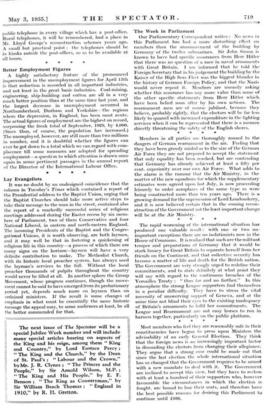Lay Evangelists
It was no doubt by an undesigned coincidence that the column in Thesday's Times which contained a report of the Presidential address to the Baptist Union, urging that the Baptist Churches should take more active steps to take their message to the man in the street, contained also the report of a markedly successful series of religious meetings addressed during the Easter recess by six mem- bers of Parliament, two of them Conservative and four National Liberal, in eastern and north-eastern England. The incoming Presidents of the Baptist and the Congre- gational Unions, it is worth observing, are both laymen, and it may well be that in fostering a quickening of religious life in this country—a process of which there are many signs on the horizon—laymen will have a very definite contribution to make. The Methodist Church, with its historic local preacher system, has always used the layman's services to the full. Without the local preacher thousands of pulpits throughout the country would never be filled at all. In another sphere the Group Movement, whose progress continues, though the move- ment cannot be said to have emerged from its probationary period yet, depends much more on laymen than on ordained ministers. If the result is some changes of emphasis in what must be essentially the same historic message the appeal may, to some audiences at least, be all the better commended for that.














































 Previous page
Previous page